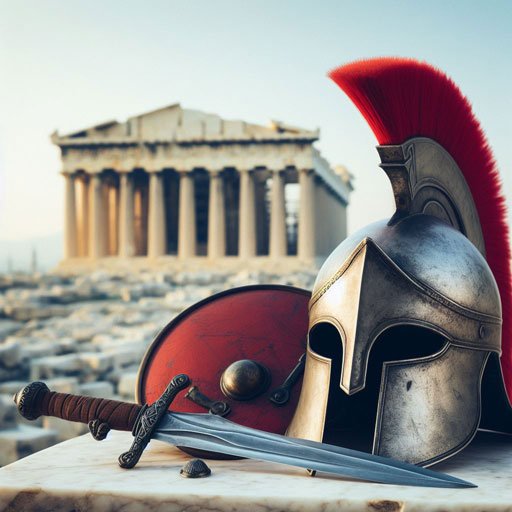Introduction: In the realm of Greek mythology, one figure reigns supreme on the battlefield: Ares, the god of war. Revered for his strength and feared for his ferocity, Ares embodies the raw power and relentless conflict inherent in human nature. Join us as we delve into the mythos of Ares, exploring the complexities of his character and the enduring legacy of his influence in ancient lore.
Section List:
- Origins and Lineage
- Attributes and Symbols
- Powers and Influence
- Consorts and Offspring
- Ares in Mythological Context
- Conclusion
Origins and Lineage Ares' lineage is deeply rooted in the intricate family dynamics of the Olympian pantheon. Born to Zeus, the king of the gods, and Hera, the queen of Olympus, Ares emerges as a figure shaped by the complexities of divine parentage. His upbringing within the divine family and his relationships with his parents and siblings play a significant role in shaping his character as the god of war.

Attributes and Symbols In artistic depictions and mythological narratives, Ares is often portrayed adorned in gleaming armor, brandishing formidable weapons such as a spear or sword. His shield, chariot, and chariot-pulling horses serve as iconic symbols of his dominion over the battlefield. Additionally, symbols of blood, fire, and vultures are commonly associated with Ares, representing his ferocity, violence, and dominance in warfare.
Powers and Influence Ares' influence extends beyond mere physical prowess on the battlefield; he possesses a mastery of combat and strategy that makes him a formidable force in the realm of warfare. Warriors invoke his name for courage and victory, fearing his wrath yet seeking his favor in times of conflict. Ares' domain encompasses not only the physical aspects of warfare but also the psychological and moral dimensions, shaping the very fabric of mortal existence.

Consorts and Offspring Central to Ares' mythos are his romantic entanglements and familial ties. His affair with Aphrodite, the goddess of love and beauty, symbolizes the union of passion and violence, intertwining themes of desire and conflict. From this liaison emerge his children, Phobos (Fear) and Deimos (Terror), embodiments of the terrifying aspects of war who accompany their father into battle. Ares' relationships with other gods and mortals further illuminate the complexities of his character and the consequences of his actions.
Ares in Mythological Context Ares' presence extends beyond his immediate sphere of influence, intertwining with the lives of other gods and heroes in Greek mythology.
- In Homer's epic poems, such as the "Iliad" and the "Odyssey," Ares frequently appears as a central figure in the conflicts of mortals and gods alike.
- His interactions with other Olympian deities, including Zeus, Hera, Athena, and Aphrodite, reveal the complex dynamics of divine relationships and power struggles within the pantheon.
- Ares' alliances and conflicts with mortal heroes, such as Diomedes and Perseus, highlight his role as both a patron and antagonist in the heroic quests of Greek mythology.
- Through his connections with other gods and heroes, Ares' character is further fleshed out, adding depth and nuance to his portrayal in the mythological canon.
-
Tense Relationship with Athena:
- Ares and Athena, both powerful deities associated with war, often clashed due to their differing approaches to conflict.
- Athena, the goddess of wisdom and strategic warfare, represented disciplined tactics, while Ares embodied brute force and aggression.
- Their rivalry is showcased in myths such as the contest for patronage over the city of Athens, which Athena won by offering the olive tree, a symbol of peace and prosperity, while Ares' gift of the spear was deemed too violent.
-
Humiliation by Heracles (Hercules):
- Ares faced a humiliating defeat at the hands of the mortal hero Heracles (known as Hercules in Roman mythology).
- In one myth, Heracles binds Ares in chains and delivers him to face judgment before the Olympian council for his role in fomenting conflict and chaos.
- This episode highlights the recurring theme of mortals challenging the authority and power of the gods in Greek mythology.

-
Feud with Aphrodite Over Adonis:
- Ares becomes embroiled in a feud with Aphrodite, the goddess of love and beauty, over the mortal youth Adonis.
- Adonis, beloved by Aphrodite, meets a tragic end during a boar hunt, sparking conflict between Ares and Aphrodite.
- Ares' involvement in the story underscores his association with both passion and violence, as well as the complexities of divine relationships in Greek mythology.
-
Alliances and Conflicts with Other Deities and Heroes:
- Ares' alliances and conflicts with other gods and heroes shape the narrative of Greek mythology.
- He is depicted as both an ally and antagonist to various deities and heroes, reflecting the multifaceted nature of his character.
- These interactions add depth and complexity to the portrayal of Ares, illustrating the eternal struggle between power, destiny, and divine rivalry in Greek mythological tales.
Conclusion As we conclude our exploration of Ares and his multifaceted interactions with other gods and heroes in Greek mythology, we gain a deeper appreciation for the complexities of his character and significance. From his tumultuous relationships within the divine family to his pivotal role in mortal conflicts, Ares emerges as a central figure whose influence extends far beyond the realm of war. May our journey through the mythological tapestry of Ares inspire continued fascination and contemplation of the timeless themes and narratives woven into the fabric of Greek mythology.
Visit our shop for interesting Greek Silver Jewelry , here

